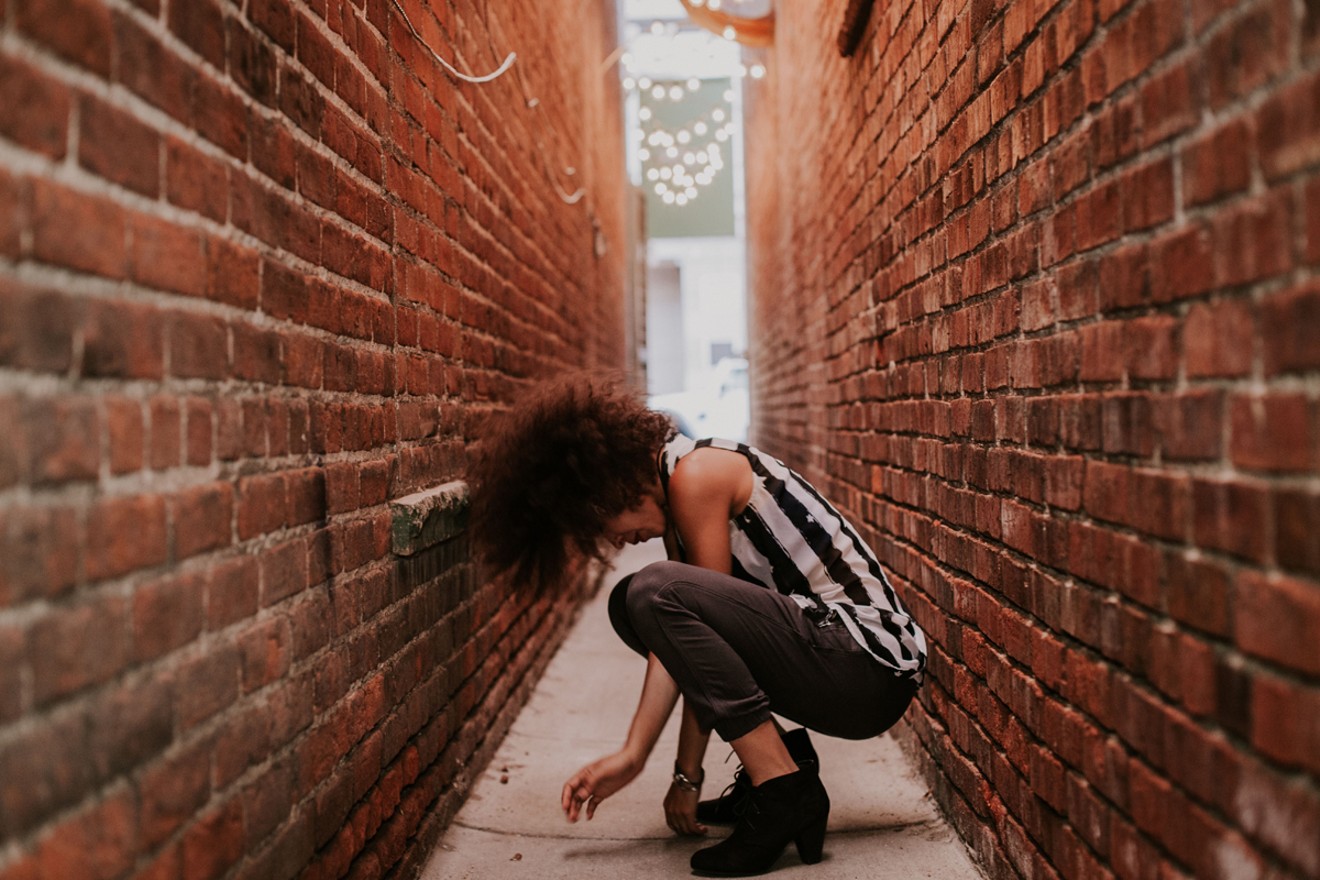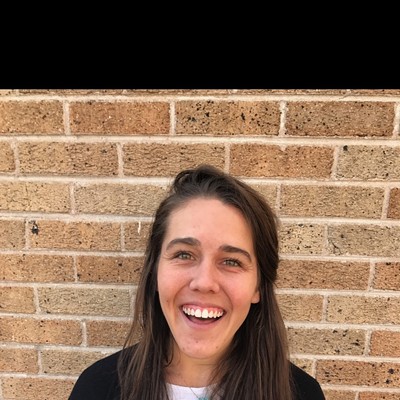After Denver poet Bianca Mikahn finished recording Left Fist Evolution, her first solo project, she had a plan: to drive into the mountains and kill herself. She was 27 and never imagined living past that age. “I remember I skipped down the stairs,” recalls Mikahn, now 36. “It was 19th and Wazee — that’s where my producer lived and worked. I skipped down the stairs like, ‘We’re done.’ I was excited to have the project done, too, but I was also like, this is it. It was going to be romantic, too: I finished my CD, it’s this posthumous release, and all this pain is done.” But when she got to her car, she found a boot on it. That saved her life...which only got harder.
The Denver-based hip-hop artist and poet was diagnosed with a disorder in which the tissues inside her uterus have grown on the outside of it, causing her constant pain. That year, roiled by agony, she would lose her home and many friends. Those still in her life were depressed, plagued by suicidal thoughts themselves and in abusive relationships. In addition, her creative pursuits had dead-ended, and she saw her once-thriving spoken-word community as stuck as she was.
“I was watching this break, like, ‘Wait, we do these shows, write these poems and books, and we’re the hottest thing going in the scene...and it’s not working,” Mikahn recalls.
Homeless, some nights she would ride the bus or walk the streets until morning. Other times her friends let her crash with them. Hers was far from an easy journey toward health. She was often home-bound, and would only leave wherever she was living at the time to work at Check Your Head, a nonprofit educating young people about mental health issues through urban arts.
“The only thing that kind of pulled me out of that space was knowing — even if it’s not my direct friend group or creative group — that I’m putting that information out there, the things I wish I’d known when I had my first anxiety attack when I was seven,” she remembers.
Her job anchored her in the midst of chaos: “I didn’t lose my work,” she says. “It was the only thing I could leave the house for. It was pretty much the only thing I could get out of bed for, because it was the only thing I saw that might help what was happening.”
Check Your Head began as an arts-and-wellness school-based program through Mental Health Colorado, offering mental-wellness resources and a creative outlet for students. In 2010, Mikahn was working for the youth arts nonprofit Art From Ashes when she was asked to collaborate with Check Your Head. She subsequently left Art From Ashes and was hired as a staff member at Check Your Head to help write the group’s curriculum.
In her early days there, she says, “it was like, ‘Here are the artists. They come in and paint, rap, do the stuff, and it’s cool. And then here is the person that talks about the mental health information over here. … I was just like, ‘Is art keeping them alive?’ Can we talk literally and in one person about how, ‘Oh, my free writes keep me alive. This is what I do. I have literal times [that] I picked up a pen instead of a razor’? Can we say that? We should say that. So we authored the curriculum and made it about those things, saying we want to reduce violence by increasing awareness.”
In July 2017, Mikahn was named the group’s executive director. The program has become an independent organization with fiscal sponsorship from Youth on Record, and Mikahn continues to develop the way in which the organization works with young people.
“I imagine so much of [the project] will be youth-led, so they’ll be choosing their medium from visual art to poetry or movement and dance and their message,” she says. “We’ll be bringing wellness information to say, ‘Here are some things that anybody with a mind should know about wellness, mental wellness and how these things interact.’ Their responses guide the creations.”
Mikahn’s work on mental health is driven by her deep desire to address various issues that young people face.
“So much of why I chose mental health as my platform is because it works for everything,” she says. “You can talk about racism, you can talk about gentrification, talk about economics and greed — why do you need more? — talk about substance abuse, any human condition. You can look at it through that lens, which I believe at its best humanizes and offers empathy and compassion. It’s a very humanist movement to say we believe that a mind, when taken care of and kept safe, does healthy and wondrous things by nature. … If mine is not doing wondrous things, then there is something missing. Not something wrong or something it didn’t do, just something missing.”
Mikahn has been processing the world around her through various forms of art since she was a kid growing up in the ’80s and ’90s in Westminster.
“I was born and raised here,” she says. “I was always looking for more. I knew there was always something else. I was looking for poetry, and I was looking for art the entire time, since first grade. Looking through my first-grade reader, I noticed some of the pages had these little words that didn’t take up the whole page, just half of it. They were really fun words, and it seemed like a game, [but] I didn’t realize I was picking out the poems. I liked the poems. Sometimes it would be an assignment descriptor or a poem, and it was like Russian roulette, reading-wise. I’d [say] ‘Oh, that’s not a poem. Those are instructions. Oh, that’s a poem — I want to read it.’’’
In adulthood, Mikahn has continued to find refuge in her own creative projects. She started seriously writing poetry in 2006 and making beats and rapping in 2009, performing at Cafe Nuba and eventually coaching the Slam Nuba slam-poetry team. She directed the experimental poetry theater production How I Got Over in 2016, and through that project grew close with Jenee Elise Donelson, a singer in the Denver band Poor Bodhi, who was working on the production.
As their friendship solidified, “she offered me extra hands around the house,” Mikahn recalls. “Started helping with chef-ing. I’d buy and she’d fry, since she has chef training. We clung to meals, outbursts, kitchen conversations and wild rantings. When we realized that we had such similar styles of creativity, humor and were compatible enough to write together, [we were] tuned in.”
In 2017, Mikahn and Donelson formed the experimental band the Maybe So’s. Mikahn produces musical tracks with bass, samples and a variety of experimental recording techniques she’s honed over the years; Donelson focuses on the melody, and they both sing. The process is therapeutic, and they describe the music as “watery.”
“I bounce back and bounce through as art continues to save me in so many ways as I serve it and utilize it,” Mikahn says. “It remakes me and shows me these new opportunities. So the sounds I was literally clinging to, like, ‘Okay, I’m just going to moan into this looper and just make something of that’ — or at least use it to get me feeling like my body systems work together, like these lungs know these ears and it matters.”
The music is deeply informed by Mikahn’s emotional state: “My drums are thick and layered, because it’s heavy like that, and I want it to feel — it’s hit the way it feels, and my emotions are very visceral and physical. All the goosebumps and stomach drops, tongue clicks, dry mouth — that’s how I experience the world. Or joyous: chest bursting and tingle going down my left arm.”
While Mikahn does not shy away from the rough edges of life, she also finds humor in the music of the Maybe So’s.
“One of our funniest songs, we can’t even do live,” Mikahn describes. “It was so perfect, so it’s only a recording. It’s me ranting about things I’m going through before we record. I’m going, ‘Can you even believe life? Why is this happening? This is happening. My feelings.’ And I come to the point where I say, ‘I just want coffee, and I don’t understand why life is what it is.’ [Laughs] It’s the most random, Adult Swim-y sort of ‘What are you doing?’ But it’s perfect.”
Bianca Mikahn at Untitled
6 p.m. Friday, April 27, Denver Art Museum, 100 West 14th Avenue Parkway, 720-865-5000.
[
{
"name": "Air - MediumRectangle - Inline Content - Mobile Display Size",
"component": "12017618",
"insertPoint": "2",
"requiredCountToDisplay": "2"
},{
"name": "Editor Picks",
"component": "17242653",
"insertPoint": "4",
"requiredCountToDisplay": "1"
},{
"name": "Inline Links",
"component": "18838239",
"insertPoint": "8th",
"startingPoint": 8,
"requiredCountToDisplay": "7",
"maxInsertions": 25
},{
"name": "Air - MediumRectangle - Combo - Inline Content",
"component": "17261320",
"insertPoint": "8th",
"startingPoint": 8,
"requiredCountToDisplay": "7",
"maxInsertions": 25
},{
"name": "Inline Links",
"component": "18838239",
"insertPoint": "8th",
"startingPoint": 12,
"requiredCountToDisplay": "11",
"maxInsertions": 25
},{
"name": "Air - Leaderboard Tower - Combo - Inline Content",
"component": "17261321",
"insertPoint": "8th",
"startingPoint": 12,
"requiredCountToDisplay": "11",
"maxInsertions": 25
}
]












